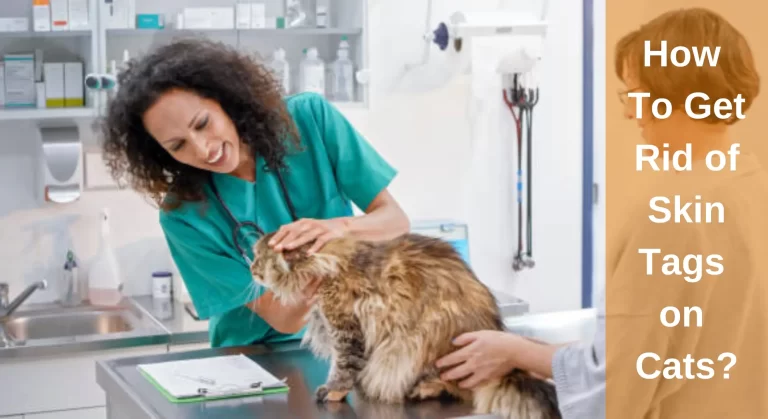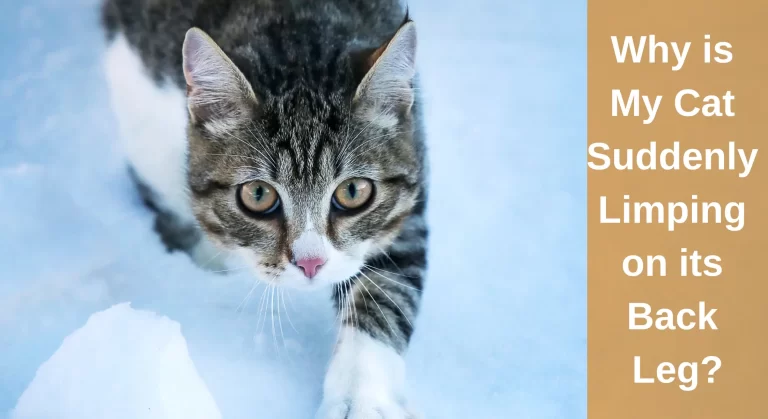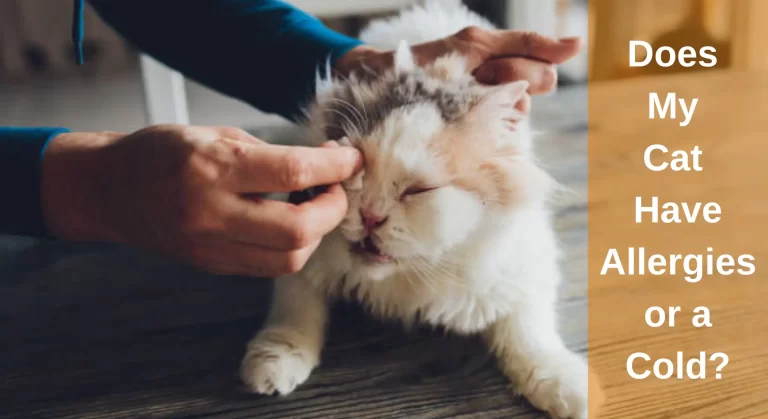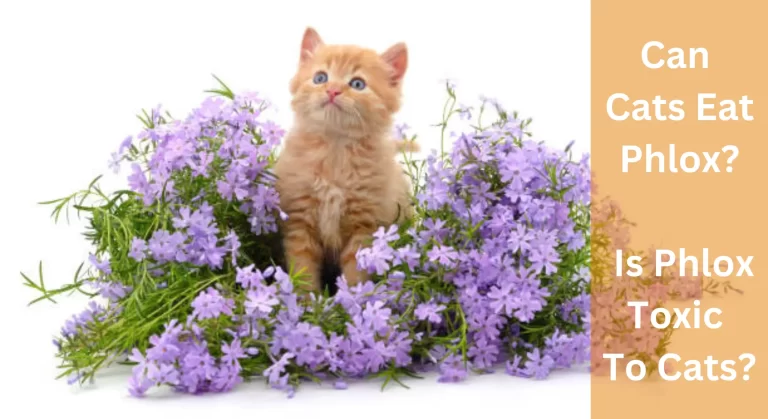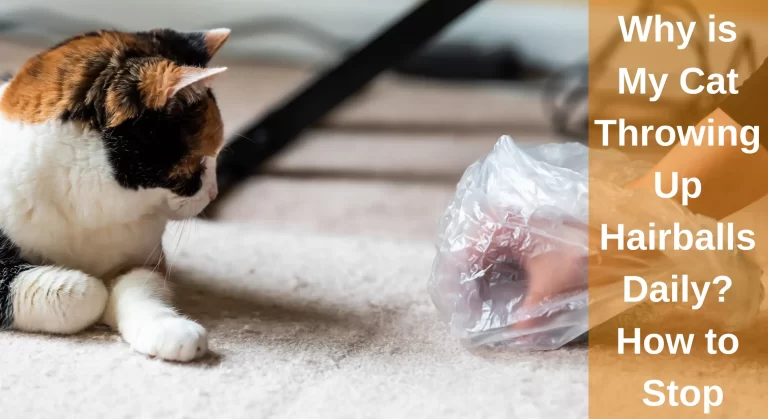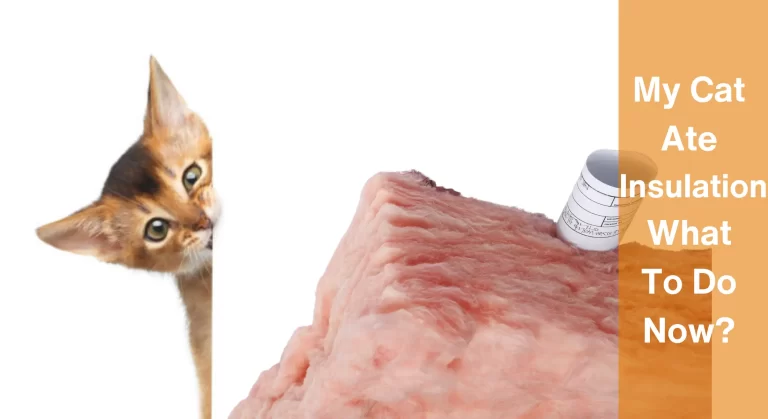Why Is My Cat Keeps Gagging But Nothing Comes Out? What To Do
Many cat parents have witnessed their cat gag, which is normal for cats. Cats that gag are most likely to have hairballs or ingested a foreign body. However, if the gagging persists with other symptoms, it may indicate a serious health problem. As a cat parent, it is essential to understand what might be causing this issue. Why is my cat keeps gagging but nothing comes out?
Cat gagging is often associated with hairballs. It may also be a blocked throat or rear causing the gagging. If cat gags without producing a hairball or becomes more severe and frequent, it may be a sign of a more serious medical condition, such as nausea, gastroenteritis, kidney disease, liver disease, or heart disease.
This article aims to explain some of the potential causes of cats gagging. Read on to learn more about this concerning behaviour and what you can do about it.

What is Cat Dry Heaving?
Retching, also known as dry heaving in cats, can make sounds like a bit of cough or a severe case of choking and stomach pains. There are instances when it’s only a hairball or a tickle in the throat, but other times it might be something more serious, like an organ infection or an intestinal obstruction.
Giving your cat a smaller amount of food more frequently may help if all of your cat’s issues are with portion control, such as eating too rapidly and spitting up the food he recently ate. However, some types of dry heaving could mean something else.
If you notice your cat dry heaving repeatedly, it might be a sign of one of the following health issues:
- Hairballs
- Nausea
- stomach or throat infection, gastroenteritis, foreign item
- renal disease, liver disease
- Heart problem
- systemic disease
You should take your cat to the vet if he is frequently dry heaving to determine the issue.
Why Is My Cat Gagging But Not Throwing Up?
Cats love to eat, and many will consume their meal rapidly. As a result, cats may retch, gag, and occasionally puke up what they just ate. In these situations, gagging is normal and unimportant. However, recurrent dry heaving should raise some red flags.
Calling your veterinarian is an excellent option if you’re still hesitant. The reasons for cat gagging are as follows:

1. Nausea
Being queasy is another factor in your cat’s incapacity to vomit. However, they are dry heaving instead of vomiting or regurgitating because of the awful feeling in their gut that is triggering a gag reaction. They could have consumed their food too quickly or all at once. Perhaps they ate toxic or indigestible substances that weren’t food or poor quality food. Various medical conditions, including diabetes and gastrointestinal infections, can also bring on nausea. Perhaps they are experiencing motion sickness!
2. Lodged Foreign Body
Cats are curious animals who like to know their surroundings as much as possible. Taste is one way they do this, among others. They will put them in their mouths to recognise various foreign items, such as bugs, threads, or pieces of plastic.
Unfortunately, the body of your cat might become stuck by these things. Your cat may have a foreign item stuck between the gums that is relatively easy to remove if it keeps making weird mouth movements. However, if it enters the digestive tract, it may block the oesophagus or intestines. If your cat appears to be dry heaving, has a reduced appetite, or shows signs of abdominal pain or swelling, you should take them to the veterinarian immediately. The vet will need to remove the blockage before causing more severe damage.
Check Out: Why Is My Cat Throwing Up Food But Acting Normal?
3. A Liver Disorder
Eliminating toxins from the blood depends on the liver, just like it does on the kidneys. It also produces proteins for the body, stores vitamins and iron, and helps maintain a healthy digestive tract by metabolising carbohydrates and fats.
Since the liver is involved in many bodily functions, a cat with liver disease may exhibit various symptoms. One such symptom is dry heaving. However, it frequently coexists with one or more of the clinical signs: skin, eye, and gum yellowing, lack of appetite, loss of weight overall, a drop in activity, and vomiting and diarrhoea.
4. Hairballs
Cats are meticulous self-groomers that spend hours each day using their rough tongues to clean, soften, and shine their fur. In the grooming process, stray hairs are consumed, and in their stomachs, alongside the debris, they remove.
Since cats are adapted to handle it, most of the time, when they ingest hair, it will pass through their digestive systems and end up in their litter boxes. But if a lot of hair is consumed, it could accumulate in the stomach and form a hairball. Therefore, hairballs are more likely to occur whether your cat sheds or if it is a long-haired breed.
Also Read: Why Is My Cat Throwing Up Hairballs Daily?
5. Gastroenteritis
Pain and dry heaving, especially after eating or drinking, are common in cats with gastroenteritis, an digestive tract infection. It might be due to bacterial, fungal, or viral conditions. GI tract tumours or malignancies swallowed foreign items stuck in the intestines, poisoning or toxicology. Endocrine disorders include hyperthyroidism and diabetes, for instance, vomiting foamy, yellow bile.
Find Out: Why Is My Cat Throwing Up Bile for Days?
Additional signs and symptoms of gastroenteritis include gagging, coughing, and diarrhoea. A cat with inflamed intestines regularly has diarrhoea but otherwise seems healthy.
6. Kidney Disease
When cats suffer from renal disease, their bodies cannot rid themselves of toxins. These toxins therefore accumulate and give cats the willies. As a result, your cat’s constant gagging may also be caused by renal disease. The rapid onset of acute kidney disease (AKD) is often caused by consuming a toxic substance. However, CKD, a chronic illness characterised by prolonged, sluggish kidney degradation, typically affects older cats.
7. Heart Problems
Heart disease refers to illnesses that interfere with the heart’s capacity to pump blood, including:
- Heart defects are among the congenital disabilities.
- Cardiac muscle mass is both increasing and reducing.
- Diseases of the heart valves, such as mitral insufficiency, musculoskeletal heart disease
Sadly, this illness is commonly referred to as the “silent killer” since its early signs are modest. The primary symptoms are difficulty breathing and walking. Some less obvious signs of a heart problem include lethargy, trouble eating, and dry retching.
What To Do If Cat is Dry Heaving?
I know firsthand how terrifying dry heaving in cats can be.
It is challenging to maintain your composure when you are aware of all the health problems it is linked to. Although some of the conditions on this list are more severe than others, keeping your cool is still a good idea.

If your cat experiences random dry heaving and has no other alarming symptoms, wait 24 hours to see if it goes away. At this time, your cat could have been able to regurgitate the hairball or foreign object. If nausea makes you choke and cough, it will stop as soon as the dry heaving does.
You should visit a veterinarian if your cat is dry heaving and has not recently vomited or developed hairballs. They will be able to conduct specific testing and identify any issues.
On the other hand, get medical assistance if you notice gagging, coughing, and renal, liver, or heart disease symptoms. Early diagnosis and treatment can considerably lengthen your cat’s life because all three conditions are highly harmful.
How Do You Handle a Gagging Cat?
You should examine the airway if your cat is gagging but not vomiting. They should reach their tongues to check for foreign objects, such as strings or ribbons.
Don’t try to take the foreign thing out on your own. Instead, seek immediate vet help, as it could be terrifying to see your furry child gasping and suffering. You should be aware that there are several reasons why someone could gag. Be cautious to keep cool under pressure to make the best choice for your cat.
What to Do If Cat Keeps Gagging And Coughing? Home Remedies
Observing your cat vomit and cough may be disturbing, not to mention uncomfortable for them as well. You might be interested in finding out how to completely prevent your cat from dry heaving or, at the least, reduce its frequency. Try putting these changes into action and observe the results.
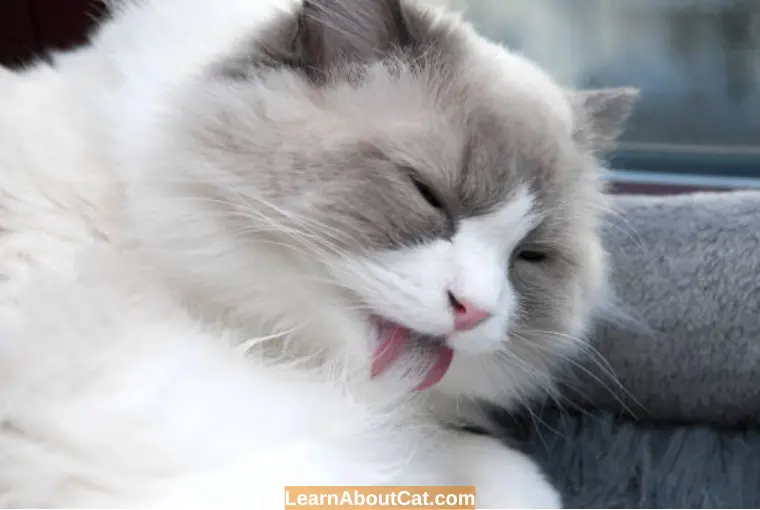
1. Regularly brushing
Hairballs are the most frequent cause of a cat’s dry heaving. Remove all loose hairs and hairballs by giving them a gentle brush daily. Both short-haired cats and long-haired varieties like Persians can benefit from this.
2. Feeding More Gradually
Simply consuming their food too quickly might make cats sick. To decrease your cat’s hunger, you may buy specialised bowls and feeders, such as puzzle feeders and balls. These are excellent for stimulating cats’ minds and making them scavenge for food like they would in the wild.
Also, Check Out: Why Is My Cat Throwing Up Undigested Food?
3. Remove Harmful Substances
As many typical houseplants are poisonous to cats, try switching to safer alternatives. The same is true when moving from highly chemical-laden cleaning products to pet-friendly ones.
4. Supervising Play
Keep Watching the cats as they play is vital since cats may eat foreign objects from anywhere. But a toy is one of the most frequent foreign things that clogs a cat’s digestive system. Feathers, thread slivers, or other minute pieces that separate might be this. To prevent this, keep a watch on cats as they play and throw away any damaged toys straight away.
5. Maintaining a Healthy Weight
Your cat’s healthy weight won’t protect them from disease. But obesity increases the risk of specific ailments. Maintaining a healthy weight may thus only enhance your cat’s quality of life. Make sure you feed them the appropriate quantity at each meal and make an effort to play with them for at least 15 minutes each day.
6. Attending Checkups
The three critical ailments on this list that must be avoided are kidney, liver, and heart disease. However, regular visits to your veterinarian can help you identify certain conditions sooner rather than later.
7. Healthy Fresh Food
Your cat may feel uneasy if they continuously want to throw up but cannot do so. This often occurs after eating spoiled food. Therefore, you may prevent dry retching by carefully keeping cat food in an airtight container and eliminating any food that has passed its use-by date.
Frequently Asked Questions
When should I worry about my cat gagging?
Generally speaking, hairballs are the cause of cat gagging the most often. However, cats have a history of ingesting foreign objects. If you have gagging that does not result in a hairball, worsens, or happens more frequently, respond immediately and regard the situation as an emergency. Call or see the emergency veterinarian as soon as you can.
Does dry heaving go away?
A cat with dry heaving can usually be treated at home, and the condition is usually temporary. In the case of prolonged dry heaving, or if your cat experience other symptoms, such as high fever, seek emergency medical attention immediately
How long does dry heaving last?
It usually takes 6-24 hours for vomiting or dry heaving to stop. Changing your diet usually speeds up the recovery process
The Bottom Line on My Cat Keeps Gagging But Nothing Comes Out
It could be alarming if your cat tries to vomit but is unsuccessful. However, the most typical reasons for dry heaving include nausea, a hairball, and a foreign object that has become trapped. Once nausea has subsided or the obstruction has been removed, your cat should rapidly return to normal.
Given the preceding, if in doubt, always visit your veterinarian since a cat’s coughing and choking might indicate more serious health issues. Try some of my preventative recommendations as well; they’ll help you and your cat by reducing the frequency of future dry heaving.
Who is Isabella?
My name is Isabella, and I am a dedicated and knowledgeable cat enthusiast. With years of experience caring for cats and a deep love for felines, I made a mission to help other cat lovers navigate the challenges of cat ownership.

